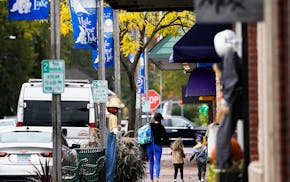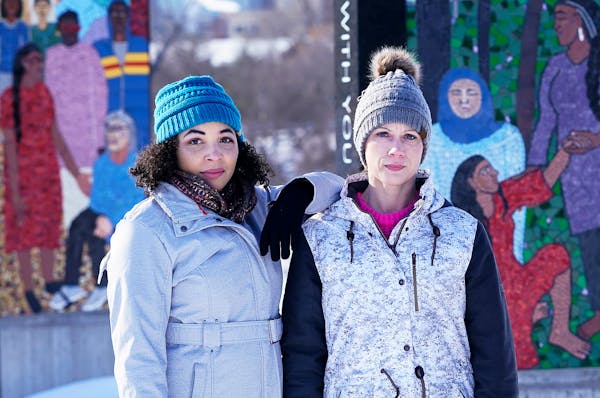When reports came in about a shooting and bombing in a medical clinic in Buffalo, a team of investigators in a St. Paul office began scouring the internet for signs of a coordinated attack.
They work out of cubicles in the Bureau of Criminal Apprehension headquarters, with TVs mounted on the walls broadcasting network news — often the first to alert them to a national emergency. A stack of six monitors in the front of the room displays the locations of planes in the state's airspace, ships sailing in and out of ports and COVID-19 dashboard data.
On the morning of the Feb. 9 assault, they found no evidence of other attackers. But they found the suspect, a disgruntled former patient, had criticized other nearby medical facilities in the past. The analysts called local law enforcement to inform them he may be targeting more than just Allina.
The little-known investigative unit is called the Minnesota Fusion Center, part of the BCA's Criminal Information Operations Section. In his 2022 budget proposal, Gov. Tim Walz says this subset of the state's public safety force will be key to Minnesota's strategy in thwarting the threat of domestic terrorism — what the Department of Homeland Security has called the "most persistent and lethal threat" to the United States right now.
Walz is asking Minnesota lawmakers to approve an initial $4 million, followed by $2.27 million annually, to build the Fusion Center into an operation that works 24 hours a day, 365 days per year. The governor's proposal cites gaps in Minnesota's current law enforcement umbrella, specifically "in identifying people with extreme ideological and violent views who seek to commit acts of violence within our communities," including threats against schools and places of worship. Walz says Minnesotans are vulnerable to attacks that begin online and can escalate into real-world violence.
"Having the best information and resources available is critical to ensuring we're ready for anything that may come our way," said Walz spokesman Teddy Tschann.
The proposal hits on two highly charged political points. It asks for taxpayer money to fund expanding law enforcement — particularly surveillance — an unpopular idea with a vocal subset of Minnesotans. Yet it could also mean bolstering the state's resources to prevent attacks from homegrown extremists à la the Jan. 6 assault on the nation's Capitol.
"Although we generally tend to ask the community not to be over-policed, the threat of white supremacy is a significant gap in policing where more resources are needed," said Imam Asad Zaman, executive director of the Muslim American Society of Minnesota, who supports the proposal.
The Fusion Center team has been a key behind-the-scenes force over the past year in crises facing Minnesota.
In January, as a fleet of state troopers guarded the State Capitol against potential copycats of the attack in Washington, D.C., the Fusion Center team was running plates of suspicious vehicles in the area.
Throughout the COVID-19 pandemic, it served as a clearinghouse for reports of Minnesotans breaking the state's restrictions. During riots that followed the death of George Floyd last summer, the analysts were gathering intelligence on groups plotting to infiltrate the Twin Cities and capitalize on the chaos.
"The whole goal is just to collect information," said Drew Evans, superintendent of the BCA. "And then we get that out to the operations staff on the line doing riot control."
Privacy concerns
The push to centralize information from disparate law enforcement agencies in the United States dates back to the middle of the 20th century and J. Edgar Hoover's era as director for the FBI, said Matt Ehling, who monitors surveillance issues as executive director of Public Records Media.
Fusion Centers, as they exist now, were opened across the country after the failure to connect the dots that intelligence leaders say made the nation vulnerable to the attacks on Sept. 11, 2001. Fusion Centers are operated by state governments, but Minnesota's network includes agents from the FBI, U.S. Department of Homeland Security, Hennepin County Sheriff's Office and Minnesota's Department of Public Safety.
The threats are real, said Ehling — but there have always been questions of whether the Fusion Centers work. He cited the Jan. 6 attack on the Capitol, planned openly on social media, as a point against their effectiveness.
Then there's the risk of civil liberties being violated, said Ehling, pointing to overreach from the FBI spying on political enemies as an example of how government surveillance can be abused.
"The real key to keeping organizations like this in their lane is extensive auditing," he said. "It's not to say these organizations don't have a legitimate purpose, but they really, really need robust oversight."
State Sen. Warren Limmer, R-Maple Grove, shares those concerns over Minnesotans' privacy.
Limmer, who is chairman of the Senate committee that oversees public safety, said he will wait for more information to take a position on the proposal. "The devil's in the details," he said.
Limmer said more surveillance raises red flags, and it will be up to lawmakers to establish boundaries if the funding moves forward.
"The very basic principle of government surveillance is whether or not there's balance," said Limmer. "Sometimes that balance point becomes really muddy, and it really takes a discipline in the Legislature to define the use of this expanded infrastructure."
New plans
On a recent afternoon, Evans stood in a cavernous room with a dirt floor in the BCA headquarters building, empty other than stacks of filing boxes.
"This was originally going to be a gun range," he said, "and we've just determined that that's not the best use of this space."
If Walz's proposal goes through, the BCA will turn this space into the Fusion Center's new office. The funding would go toward renovating the area and ramping up the Fusion Center's analyst staff from seven to 21, allowing for round-the-clock operations. It would also fund four more state agents to work in an FBI's joint counterterrorism task force, said Jill Oliveira, spokeswoman for the BCA.
Evans said the BCA is mindful of privacy concerns and is careful to balance them with the need for investigating potential threats.
At the Star Tribune's request, the BCA provided examples of threats neutralized by the Fusion Center in the past. They did not give specific details, citing data privacy.
In one case, the Fusion Center responded to a tip from Colorado about a threat to a high school. No school matched the description in Colorado, but Minnesota analysts found two schools here that fit. They called the schools and identified the student who'd made the threat, who had recently moved to Florida, and then contacted local law enforcement in that area.
As a result, said Evans, authorities in Florida interrupted a potential school shooting.
Evans said making those connections would have taken a lot longer without the Fusion Center.
The Minnesota Fusion Center will also be active during the upcoming trial for Derek Chauvin, the ex-Minneapolis police officer charged with killing Floyd, and the anticipated revival of protests, said Evans.
"We want everybody to exercise their First Amendment rights in a peaceful manner … but we need to do it in a safe manner," said Evans.
The proposal to expand the investigative unit now goes to the Legislature. Between now and this summer, Walz and lawmakers will come to an agreement on a final budget for the fiscal year starting in July.
Andy Mannix • 612-673-4036

Shop the curbs for free on 'Trash to Treasure Day' in White Bear Lake

Longtime Uptown boutique closing in May

Meet the Athena Award winners: 103 female athletes honored by their schools

Lacrosse lists: 21 top players and the school that's No. 1 for boys and girls

